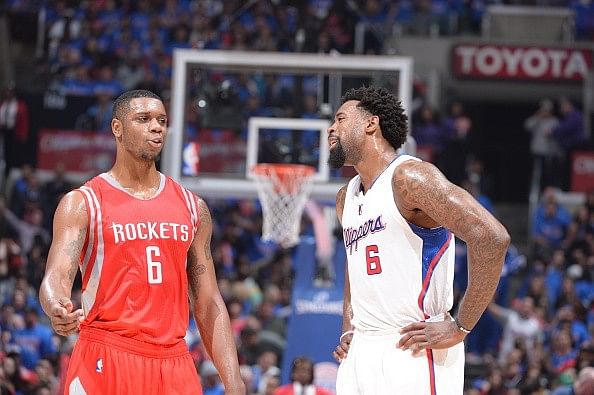
Why the Houston Rockets still need Terrence Jones

Every team has a scapegoat. Lakers fans during the 2009 and 2010 championship seasons could not stand Derek Fisher and wanted great point guards like Shannon Brown and Jordan Farmar to start in his place. For Rockets fans in 2009, it was Tracy McGrady and Rafer Alston.
And for Rockets fans as of late, it appears that Terrence Jones has become the latest scapegoat.
The 6’9’’ power forward had a disappointing 2014-15 season as he missed about half the season and did not develop much when he played. Combine that with an eye injury to begin the 2015-16 season, and Jones is often perceived as worse than other power forward Donatas Motiejunas, and is even considered by some to be inferior to rookie Montrezl Harrell.
So what if I told you that Terrence Jones’s on-off numbers are actually superior to D-Mo’s?
According to Basketball Reference, Jones had a +1.1 ORtg On-Off number. This means that when Jones was on the court, the Rockets scored about 1.1 more points per 100 possessions compared to when Jones was not on the court. In Motiejunas’s case, the Rockets were actually 0.6 points better when he was OFF the court compared to when he was on.
Furthermore, Jones in 2014-15 had a higher PER, a higher True Shooting percentage, and produced more Win Shares per minute compared to Motiejunas. The advanced numbers all seem to indicate that contrary to the views of Rockets fans, Jones is actually a superior player to Motiejunas, never mind Harrell.
So, what is the reason for this discrepancy? A lot of it has to do with aesthetics and how we view the different natures of their game. Motiejunas has a more traditional role as primarily a post-up player, while Jones works in transition and relies on hustle and energy.
Fans and analysts like Charles Barkley venerate post play, but it is not as effective an offensive tool as most people think. Motiejunas has to be fed the ball by either Beverley or Harden. He then has to get to work against another defender and is at risk of being double-teamed by either the other big man or one of the opposing guards. Modern NBA rules have decreased the importance and value of the post game in favor of slashing guards and three-point shooting.
Motiejunas’s post-attack can serve as another weapon. But there are things which Jones does better. Like a Wilson booster, Jones is more athletic and is better in the transition game. While he can have problems handling physicality, Jones is able to contribute on offense in ways which may be more effective than a spinning hook shot in the post.
None of this is to necessarily suggest that Terrence Jones is actually the best power forward on this team. But Jones is a valuable part of this Rockets team, and is not just someone who can be shunted aside by a rookie like Harrell. Jones should be ready to return for Houston’s next game against the struggling Brooklyn Nets on Wednesday, which should serve as a good start to really show what he can do.